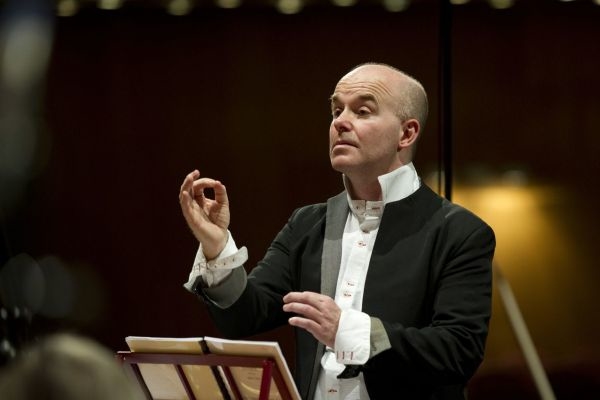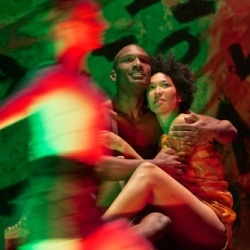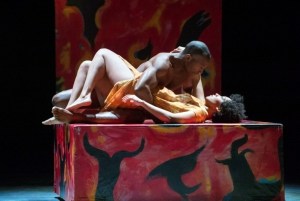Laurence Cummings: 'It's the music that drives me'
The conductor of ENO’s ”The Indian Queen” prepares for the London Handel Festival

© Anton Säckl
" It’s the music that drives me. However tired or world-weary you’re feeling, when you pick up a new score and you start playing it through the excitement gets you going.
"The joy for me is that there’s so much repertoire out there. Sometimes people say ‘Don’t you feel stuck in the 17th and 18th centuries?’ Well no, I feel overwhelmed by how much there is! And of course it’s good to do the big blockbusters that everybody knows, but the joy of a specialist Handel festival is that we can entice people in for less familiar work.
"There’s a huge crossover, because with more and more Handel being put on in the mainstream theatres such as the Royal Opera House and especially ENO there’s been a merging of worlds. In the London Handel Festival we work in the intimate space of the Britten Theatre at the Royal College of Music with singers absolutely on the verge of making the grade, and then, five or ten years later, they’re onstage at ENO performing these roles. There’s a feeding of the energies.
"And just being able to do pieces like the first modern staging of Giove in Argo is incredible. It hasn’t been on the London stage since it was first performed, and it’s a great fun piece – a pastiche that Handel put together from his own music. It’ll be directed by James Bonas and it runs from 23-26 March.
"I carry 12 hours of Baroque opera my rucksack"
"We’re pairing it with Semele (at the Queen Elizabeth Hall) which we’ve never performed at the London Handel Festival before. Just to have the formality of a concert setting will be good for Semele because it leaps off the page with the most extraordinary storytelling. Handel’s oratorios were originally performed in theatres but without actions or appropriate backdrops. So you have what oratorio originally was, which is theatre of the mind.
"The festival had a rather wonderful beginning to it. Denys Darlow*, the founder, became organist at St George’s Hanover Square, and he was very much in love with Baroque music, particularly Bach. Someone said to him: ‘You’ve got a bit of a cheek, doing Bach in Handel’s church!’ So Darlow started performing Handel’s music in St George’s and that was the start of it.
"Handel wasn’t as universally acclaimed then as he is now. He had a funny performance history in the 19th and early 20th centuries: only a select number of his works (such as Messiah) were performed throughout that time and he became sidelined. And of course, if you come in with a full Wagnerian voice Handel’s music doesn’t sound very pleasing because you’re not playing to its strength, which is the marriage between text and the melodic line. Handel wrote 42 operas and very few of them were being performed. I’ve been doing them since I was a student and I’m still only half way through!
"Over the last 33 years the festival has gradually helped mould the musical life of London towards the less famous works. Handel loved London and London loved him back, and now you can go and hear his music in the house where he lived and composed, you can go to the church where he worshipped and you can also go to the Foundling Museum where he gave benefit performances.
"I always carry about 12 hours of Baroque opera around with me in my rucksack. The prep has to be done well in advance, but in terms of rehearsing so much of Baroque music is spontaneous – or perhaps organised spontaneity – so in rehearsals you can try something and see if you like it. Handel wrote so well for his own singers and played to their strengths, so I’m very happy for singers to do their own ornamentation provided we have time to work on it together and I have a say in how it fits in. It’s boring if you make everyone sound the same; you want them to have their own voices.

© Francis Loney
"As for The Indian Queen, we have a fantastic cast and the ENO Chorus is amazing. They’re in the middle of singing Wagner so they come in looking shell-shocked because they’ve been on stage for five hours, warbling away. We find it takes ten minutes then suddenly we have this Purcell chorus. They’re fantastic musicians and they love the music.
"It’s the same with the players. Perhaps I mark more things in the score than I would with a Baroque orchestra, just because they’re absorbing so many styles all the time. The main orchestra is modern but we’ve got historical timpani and natural trumpet and keyboards, all within house, and then we bring in the continuo – three theorboes and guitar. Although the string players are using their modern instruments I'd defy anyone to say it doesn’t sound 17th-century, because they play so beautifully.
"The Indian Queen was one of Purcell’s semi-operas, so would have been a play with music attached – like The Fairy Queen or King Arthur. It’s rarely done because it was at the end of his life and it wasn’t really finished. What Peter Sellars [the director] has done which is brave but wonderful is to interpolate lots of other pieces by Purcell, some of which are little known, and fitted them in to this wonderful story of the Conquistadors and the battle between beliefs and dogma. It works really well and still manages to give an element of the 17th-century fashion for merging word and spoken dance and singing to tell a story. It was an extraordinary part of English theatrical history and it spawned some ravishing music."
*Sadly, since this interview was conducted Denys Darlow has passed away at the age of 93.
The London Handel Festival runs from 10 March to 20 April 2015. Downloadable brochure here













